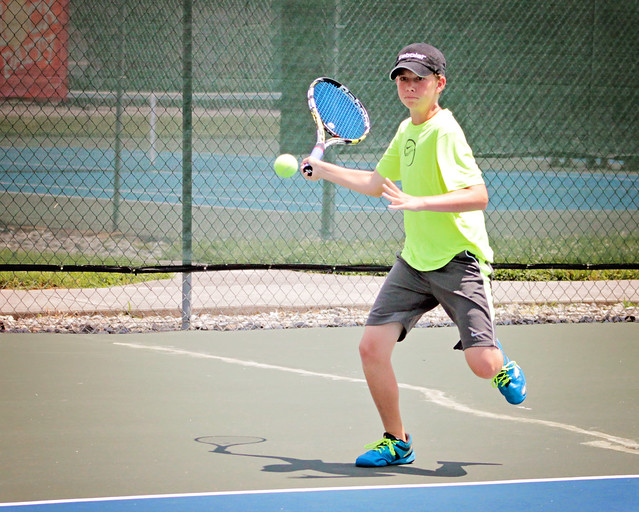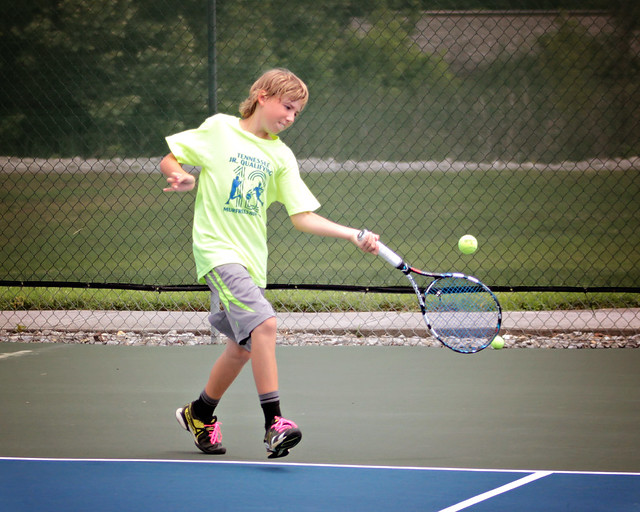This is a tough sport. It requires no pads. No one has to wear a helmet. Some may use mouth protection, but you don't see it often. All you really need are a good pair of shoes, a fresh can of balls and a decent racquet.
And exceptional hand-eye coordination. The the ability to fly around the court. Chess-like decision-making skills. Endurance. Mental toughness. An opponent who has a strong understanding of sportsmanship and ethics.
These kids go out on the court and take care of business. They don't have line judges and chair umpires and ball boys. They call their own scores. They call the outs. They come to the net and work out disagreements.
It's hard.
It's hard to be that competitive and look at a ball you want desperately to be out and call it good. But for the most part, I watch kids do that every weekend. And they do it well. There are some bad calls, but there are bad calls in professional matches with chair umpires. 90% of the kids in the tournaments I've watched do their best to make good calls.
There are resources available to kids in a tournament who feel their opponent is not making good calls. They're allowed to leave the court and find an official and ask that official to watch the match. I've seen it a few times, and I've seen those officials go out, act impartially, and help everyone on the court by being there.
This past weekend, however, I saw the worst sort of playing and officiating. I was thankful that it wasn't on a court with one of my boys, but it did happen on a court with a boy that trains with mine. He's one of those kids that is completely straightforward in his game. He makes good calls - sometimes he's a little too generous with his lines. He is calm on the court, rarely making any triumphant "C'mon!" calls, rarely showing any displeasure when he makes a mistake. He just wants to play, play well, and win. And he does.
I watched him play a match on Sunday against a boy who was a good player. The first couple of games seemed pretty even, but that's about when the cheating started. The opponent started calling balls out a little more regularly. He started making late calls, based on where he thought his ball was going. He tried to change the score. He started being disruptive. So, my boys' friend, let's call him Honest Bob, went to get an official. The official came out, watched the match for a while and then was called to another court.
The other boy made excellent calls while the official was on the court, of course. He started his nonsense right back up as soon as the official left. Honest Bob would get an official again. Official would come out. Cheaty McCheaterson would start up again.
Lather. Rinse. Repeat.
The first set went to a tiebreak, which Bob won.
Flash forward to the second set. It's tied up at three games each, McCheaterson serving. He lost three points in a row, making the score 0-40. Bob hit one wide on the next serve. McCheaterson drops the balls on the court and starts walking to the score board to give himself the game. The score should be 15-40...a long way to go before winning the game.
Honest Bob stops him - asks what he's doing. Cheaty says he just won the game. There are words at the net, and Bob leaves the court, yet again, to get an official. When he comes back, it's with a different official than the one who's been on the court umpty-four times already. He talks with the boys.
Typically, in such situations, the official will ask each boy for his side of the story and try to get them to agree on a score. If the official wasn't on court at the time, he can't make a determination about who is telling the truth. In the stands, we all start to assume they're going to have to replay the entire game, if they can't agree on any points.
Instead, we all watched in disbelief as the official walked over to the scoreboard and flipped the card on McCheaterson's side to 4. After listening to both boys, he decided that Cheaty must have won. The spectators in the stands erupted. Bob ran off the court to get a higher official.
Long story short - well, shorter - the head official takes the game back to 30-30. Bob goes on to lose that game, the set, and eventually the match. The emotional strain had overwhelmed him, which was, of course, exactly what Cheaty McCheaterson was going for. He didn't care if he won that game. It was a calculated effort to disrupt the mental game of Bob.
And that's ridiculously sad.
Sadder still is the official who decided to make a ruling based on the acting skills of a boy who had set up the whole thing. He acted as if he had the power to change the game score, to accept the word of just one side, and he didn't. His entire role was to be a mediator, not a judge. It's pretty clearly outlined in the guidelines what to do in the case of a dispute, and he didn't do it, not by a longshot.
What he did was undermine the credibility of his position. We tell these boys all the time - if there's a problem, get an official. If you think someone is making bad calls, get an official. How many of the boys that were watching that match will want to go get an official when tensions erupt? How many times will Bob go and get help after that match?
It's unfortunate, but in the long run, Bob will continue to get better and Cheaty will start to falter. Cheaty actually lost his next match, and Bob went on to win a couple more. I talked to Bob after his match, and he was so discouraged. He just wanted to go home - to give up, because that just sucks the fun out of the game. But he didn't. He processed the loss, found some positives to take away from it and moved on. And I was proud to know him, in that moment.
Because sometimes wrong wins. Sometimes bad behavior succeeds. Sometimes cheaters prosper.
But nothing feels better than an honest game. Nothing feels better than getting into bed at night, knowing that whatever you did that day, win or lose, you did it with integrity and honor. And nobody can truly beat you, if you hold onto your standards and do the right thing.
Good work, Bob.


